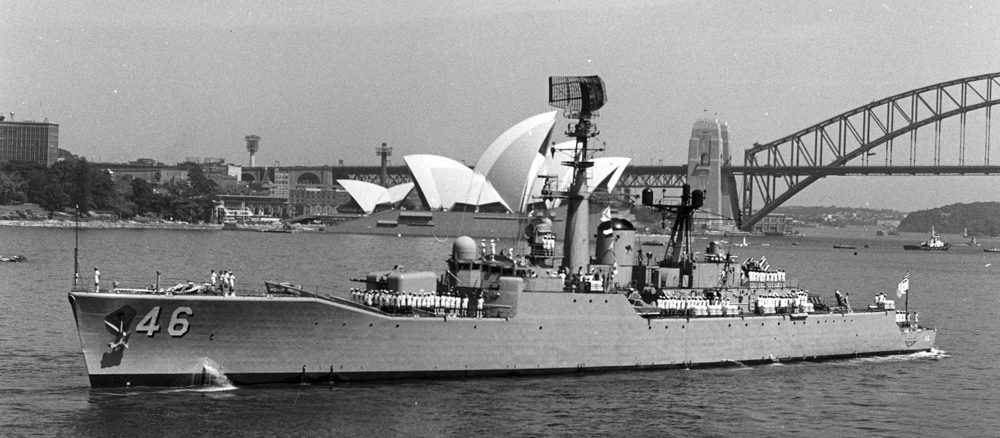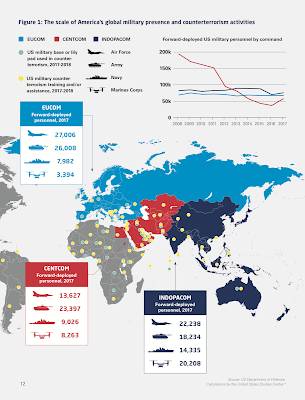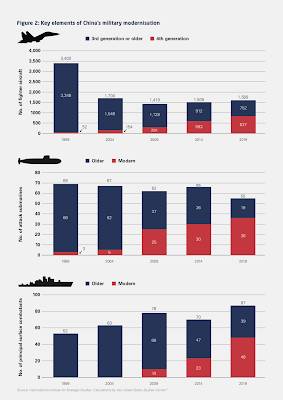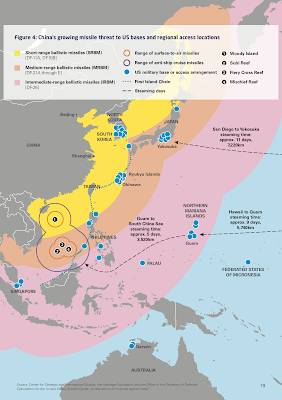
A report by the United States Studies Centre at the University of Sydney in Australia entitled "Averting Crisis: American Strategy, Military Spending and Collective Defense in the Indo-Pacific" provides us with an interesting method of looking at the American way of war, how America's military primacy is under threat in the Indo-Pacific region and why Washington may have to rethink its strategy. Let's look at some of the highlights.
Here are quotes from the report's opening paragraphs which clearly state the issue facing the United States in the Indo-Pacific region:
"America’s military primacy in the Indo-Pacific is over and its capacity to maintain a favourable balance of power is increasingly uncertain. This is the stark reality facing US defence strategy today. After nearly two decades of costly distraction in the Middle East, the United States is struggling to meet the demands of great power competition with China and faces the uncomfortable truth that its armed forces are ill-prepared to succeed.
Since the early 1950s, America’s position in the Indo-Pacific has rested on its ability to defeat aggression, protect a network of allies and preserve a strategic order in which no single nation dominates. But this foundation of stability is now under strain. China’s military is increasingly powerful, while America’s warfighting edge has dangerously eroded." (my bolds)
As the world's sole superpower following the collapse of the Soviet Union, the United States has spent the past two decades working to maintain its military supremacy in the world's most strategic regions; Europe, the Middle East and the Indo-Pacific. Certainly both trade and diplomacy have played some role in the projection of America's power around the globe but its dominance has been Washington's ability to project combat power around the globe. This projection of American military might is most notable since the end of the Second World War in the Western Pacific region where Washington has developed a strategic perimeter stretching from South Korea to Japan to Taiwan and the Philippines. It is this perimeter and the American presence on Hawaii, Guam and Diego Garcia (among other Pacific Islands) that have historically checked the rise of China as a great power adversary. This military strategy can no longer be taken for granted largely because "...the ends of America's global strategy now outstrips its means…". The report notes that "…the combined strength of America's five military services (Joint Force) no longer has the resources, force structure, technical edge or operational concepts to fully achieve its global commitments…".
There are several reasons for this degradation of America's military capabilities:
1.) the two-decades of war in the Middle East – examples of problems include the following:
a.) only one-third of the Army is prepared for deployment.
b.) less than 50 percent of the Air Force was ready for a high-end fight with a great power.
c.) 53 percent of Naval and Marine Corp aircraft are deemed unfit to fly.
2.) reduced expenditures on defence and unpredictable defense funding levels thanks to Congressional dysfunction.
3.) underinvestment in long-term great power competition strategy which has left America's Armed Forces technologically obsolete.
4.) Washington's liberal and democracy order-building strategy has led to an expansion of commitments to 69 nations around the world.
Here is an interesting graphic which shows where the problems for the United States lie:
As you can see, the U.S. military has a substantial investment in counter-terrorism scattered around the globe; estimates show that the Department of Defense has spent over $1.8 trillion (some analysts suggest that the amount is far higher with the Watson Institute total expenditure hitting $5.933 trillion) on the global War against Terror since September 2001, an investment that has had very little payoff and has served as a distraction from the rise of the great power competitors.
The 2018 version of the Department of Defense's National Defense Strategy (NDS) noted that interstate strategic competition should be the primary focus of America's defense strategy. The NDS portrayed China as the most significant challenge to United States global hegemony over the long term. Rather than defeating two mid-level regional challengers in simultaneous conflicts as has been the Pentagon's strategy for the past quarter century, the 2018 edition of the NDS prioritizes the defeat of a single great power adversary, either Russia or more likely China.
The authors note that the "American way of war" using the example of the 1990 – 1991 Gulf War is no longer feasible against great powers like China (and Russia). Since the mid-1990s, China has studied this military strategy and has advanced programs that will target vulnerabilities in America's way of fighting wars. As well, China's fighting forces have evolved from an antiquated Soviet-style institution into a modern, technologically advanced fighting force which has largely been funded by China's economic miracle. Over the two decades plus between 1996 and 2018, the People's Liberation Army defense spending has risen by 900 percent, allowing advanced in key areas including the following:
One of China's greatest advances has been its missile program which has resulted in this threat profile:
Let's look at one scenario. As it sits now, China's formidable military could quickly seize territory including Taiwan, Japanese-administered islands in the East China Sea as well as other features in the South China Sea that belong to U.S. allies. By striking first, China could secure strategically important objectives before the United States has a chance to act. Here is a quote from the report:
"Asymmetries in power, time, distance and interest would all work against an effective American response. Under present-day US posture in the region, most American and allied bases and forward-deployed ships, troops and aircraft would struggle to survive a PLA salvo attack, and would be initially forced to focus on damage limitation rather than blunting the thrust of a Chinese offensive. American forces that are able to operate would be highly constrained in the early phases of a crisis — lacking air and naval dominance, outnumbered by their PLA equivalents and severely challenged by the loss of enabling infrastructure, like functioning airstrips, fuel depots and port facilities, all of which would be at least temporarily degraded by precision strikes.
Reinforcements from outside the A2/AD (anti-access/areal denial) threat envelope would take considerable time to arrive from Hawaii or the US west coast and, as former Commandant of the US Marine Corps General Robert Neller has warned, they would first “have to fight to get to the fight”. Although the United States would probably — but not certainly — prevail in an extended war, escalation at this point would be enormously costly and dangerous. Herein lies the nub of a fait accompli: Because America’s interests in the security of its allies are “fundamentally secondary” to its own survival, and arguably less tangible than the core interests Beijing has at stake in many of these flashpoints, Washington may ultimately wager that intervention is not worth the candle.
The broader ramifications of a Chinese fait accompli would be devastating for the Indo-Pacific balance of power and the stability of America’s alliance and partner network….At the diplomatic level, the failure to prevent a Chinese attack on allied territory would exacerbate rising concerns about America’s capacity and willingness to act as a security guarantor in the region." (my bolds)
As you can see from this posting, the United States faces a future where its primacy in the Into-China region is diminished to the point where it cannot win a war against China. The United States military has spread itself across the globe, waging wars that have no end (Iraq and Afghanistan) and battles that are unwinnable (Syria). The Pentagon always seems to be fighting the "last war", using strategies that are ineffective in today's military reality. On top of that, there is a mindset problem in Washington as shown in this final quote from the report:
"Meeting this challenge, however, requires hard strategic choices which the United States may be unwilling or unable to make. In an era of constrained budgets and multiplying geopolitical flashpoints, prioritising great power competition with China means America’s armed forces must scale back other global responsibilities…
It is far from clear that Washington has the strategic discipline and political will to make the difficult trade-offs that a strategy of prioritising great power competition with China requires….
At the heart of this dilemma is the persistence in American political and foreign policy circles of an outdated “superpower mindset” that regards the United States as sufficiently endowed in economic and military strength to not have to make strategic trade-offs. Those adhering to this primacist school of thought fundamentally reject the idea that Washington should limit its defence strategy and liberal order- building agenda in order to conform with present- day resource constraints. One of the rationales for this position is the conventional wisdom that America’s superpower status hinges on its ability to prevail in at least two simultaneous “major regional contingencies”, in addition to prosecuting a wide array of less demanding global security tasks." (my bolds)
Recent world events suggest that the United States will find it increasingly difficult to change its mindset. With ongoing unrest in Afghanistan and continued sabre-rattling in both North Korea and Iran, there is one thing that we can count on; Washington is unlikely to change its stripes when it comes to making meaningful preparations for a potential conflict with one (or both) of its great power competitors, preferring to fight a number of smaller, lengthy conflicts scattered around the globe.
Click HERE to read more from this author.
You can publish this article on your website as long as you provide a link back to this page.




Be the first to comment